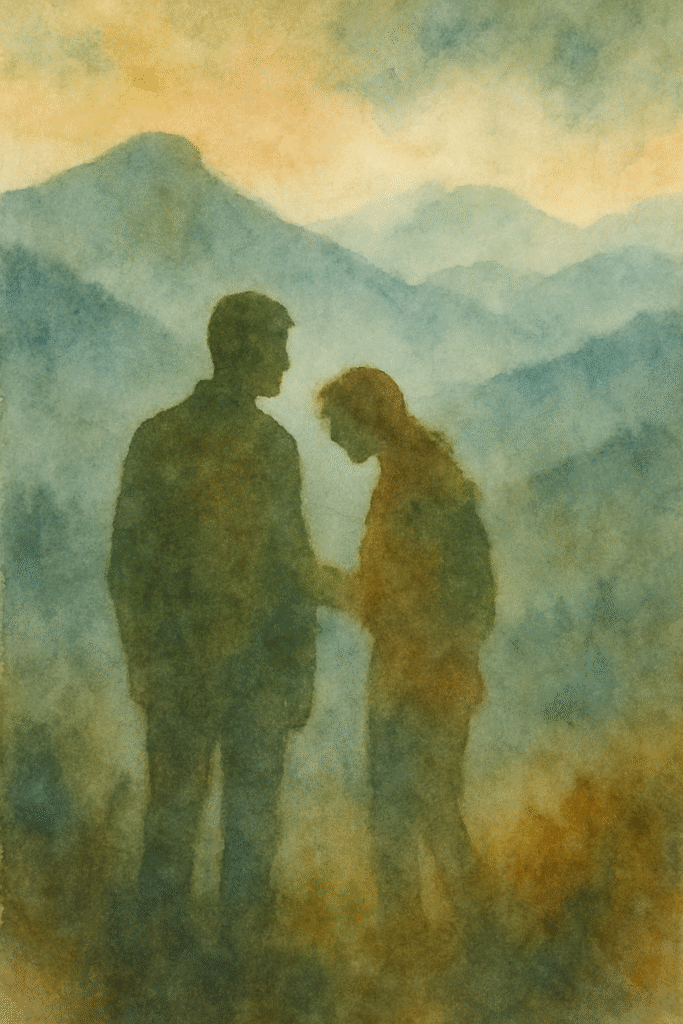I first saw him near Neels Gap, sitting barefoot on the steps outside Mountain Crossings like he’d been born there, smiling at nothing, sipping Gatorade like it was champagne. His pack was a joke. I clocked it at twenty-five pounds, minimum, probably with a camp chair and full-size toothbrush inside. And I was right. Later, I saw the chair.
I passed him three times over the next two weeks. Each time he was ahead of me, even though I’d never seen him hike. Slackpacker. Obviously. Trail angel vans, daypacks, motel overnights. Meanwhile, I logged every mile. I carried every ounce.
He wasn’t one of us.
So why couldn’t I stop noticing the way his eyes softened when he looked at the rhododendrons in bloom?
Why did it bother me that he remembered my name?
“Skye,” he’d say, nodding like we were old friends. “You move like you’re part of the mountain.”
“Thanks,” I’d mutter, marching past.
Because I had something to prove. Because I was out here to forget someone who once told me I was too fragile to be alone.
And maybe I was trying to prove it to myself, too.
I found him again at Max Patch. He was setting up a tarp in a careless sprawl as the sun painted the sky blood-orange. I was going to camp in the trees. That was the plan.
But I didn’t move.
“I’ve got room under here,” he said, without turning around. “No strings. Just shelter from the wind.”
“I’m fine,” I said.
He nodded like he believed me. Which only pissed me off more.
Later, I couldn’t sleep. The wind howled, and something small and scared pressed against my ribs from the inside.
I crept back up the hill and stood near his tarp. “You were right,” I said. “It’s cold.”
He didn’t gloat. Just lifted his quilt and made space for me and mine.
We lay in silence, our backs not touching, but close. I stared at the stars, counting every breath between us.
“You think I don’t earn my miles,” he said softly.
“I don’t think. I know.”
“Then why are you here?”
I didn’t have an answer.
He didn’t push.
That made it worse.
It wasn’t until Hot Springs that I saw him with the prosthetic. His right leg, below the knee, was carbon fiber. A work of art, really. But it made sense now. The van rides. The skipped climbs. The slow, thoughtful way he descended rocky slopes when I passed him again days later.
I felt like I’d been punched. Not because I pitied him, but because I’d built a story around him that wasn’t real.
“I was a firefighter,” he told me that night, when I finally asked. “The house collapsed. My partner made it out. I didn’t. Not all of me, anyway.”
He looked at me then, the way people look when they’ve already forgiven you.
“I didn’t think I’d ever hike again. Then I figured out how to walk a little farther. Then a little more. Trail angels help me with the rest.”
I wanted to disappear into the moss.
Instead, I cried.
He didn’t try to touch me. Just sat there, letting it happen.
“I thought you were cheating,” I whispered.
“I am,” he said. “Death told me I’d never make it past Springer. Every mile I hike is a mile I stole back.”
After that, we stopped pretending we weren’t hiking together. We still walked at different paces, but we’d meet at the gaps. At sunrise on fire towers. At dusk beside creeks, where he taught me how to savor instant mashed potatoes with gummi bears like a gourmet dish.
We didn’t talk about what we were. Not out loud. It was in the way he checked the trail for loose rocks and snakes ahead of me. The way I learned to slow down for no reason at all.
One night near Grayson Highlands, he pulled me into him as lightning split the sky. Our breath synced, our bodies curved together in a way that felt like shelter and surrender all at once.
“I was wrong about you,” I said into his shoulder.
“I know,” he said. “But you needed to be.”
We made love that night with the storm pounding around us. Fierce. Wet. Honest.
Later, as he slept, I ran my hand along the scar where his leg ended and thought, this is what strength looks like.
